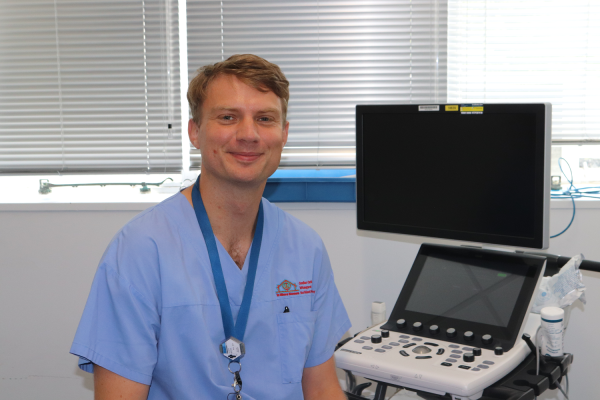First Class Cardiology Training at Whangārei Hospital - Learning in the 'heart' of the North
Last year, Whangārei Hospital became a fully accredited advanced training site in cardiology.
Dr Robert Michael is the first advanced trainee in cardiology at Whangārei Hospital, after completing basic medical registrar training. Advanced trainees in cardiology are required to undertake three years of full-time training. 
Robert jumped at the opportunity to apply for the trainee position after previously spending six months of his registrar training working in the Intensive Care Unit at Whangārei Hospital, where he met Dr Marcus Lee, who initiated the Cardiac Catheter Laboratory (Cath Lab) at Whangārei Hospital.
Robert said it was no easy feat being the first advanced trainee here at Whangārei because there was no blueprint to work from. However, he fully embraced this unique situation as an opportunity and enjoyed working with the Auckland and the Northland teams to help carve out a programme that is suitable and sustainable for future trainees.
"A lot of time goes into the supervision I received, especially in the Cardiac Cath Lab. It's very structured because procedures such as angiograms are invasive, so we must work as a team to achieve the best outcome. I can now do the basics, like assessing someone's heart arteries for major blockages that might require advanced therapies. However, more complex cases, for example, implanting stents in people's hearts, were undertaken by the senior medical officers. Sometimes, this could also involve patients going directly to Auckland via helicopter if an unstable picture evolved. It was all great to witness and learn from first-hand."
While the cardiology trainee role was a Monday to Friday position, he also undertook shifts in the emergency department or medical wards out of hours, which he believes is vital for a trainee post because all the services are integrated.
"All specialities come under the general medicine service, so it's important to understand the hospital, know what services are available, and how the wards work. It is easy to submerge yourself into your chosen speciality, but that can lead to a lack of understanding other hospitals pressures."
After spending a year in Northland, Robert believes the main benefit of training in a smaller centre was having the option to split his time across different fields of cardiology, depending on inpatient demands. In contrast, at larger centres in Auckland, trainees typically spend six months solely focused on a single module such as cath lab, echocardiograms, and electrophysiology.
Robert found no barriers to achieving mandatory procedures, including over 400 angiograms, 200 echocardiograms, cardiac MRIs, and CT scans. This should help lay solid foundations for training success on his return to Auckland.
"At present, because the Whangārei Hospital programme is new and thus relatively unknown by other trainees, I felt very fortunate with this placement as I was able to seize all opportunities for learning."
Another main insight into the year was having the chance to work inside the local community and understand the diverse needs of Northland patients. The region has a significant burden of cardiovascular disease in New Zealand, and he hopes for continued training, research, and educational growth in the district. In particular, he enjoyed the opportunity to attend rural clinics at Bay of Islands, Dargaville, Kaitaia and Rawene Hospitals. These clinics help reduce the need for people living rurally to travel for basic assessments.
"Until you work in Northland, it is difficult to understand the geographical spread of patients, their cultural environment and the inequity they face on a daily basis. We find some phone calls to Auckland are answered by people who are unaware of the local resources. Training roles such as this will help to bridge that gap because people are starting to talk about what the cardiology unit is doing here, how we're developing the service, and how essential it is."
Although every day is different in the cardiology unit, Robert said he would typically start with procedures, like an echocardiogram or cardioversion. Then, he would attend clinics or ward reviews.
"There was flexibility in the timetable, which I liked. For us, it is all about our patients and being able to provide them with as much as possible."
Robert said the Cath Lab at Whangārei Hospital is unique because of the numbers that are seen and the small waitlist. In addition, the services include cutting-edge cardiac MRI, which is a vital investigation for patients of this size population.
"I thoroughly enjoyed my time in the Cath Lab but am very aware you need a whole family to run a cardiology department. It includes sonographers, radiographers, admin staff, porters, healthcare assistants and experienced nurses who together really run the show."
Robert is excited for the next trainee to experience this role and the fantastic people who make up Whangārei Hospital.
For him, though, the next six months will be spent working as a research fellow at Middlemore Hospital. After this, he will undertake several other posts in the Auckland region to complete his training.
This programme has been a substantial project accredited to Dr Peter Ruygrok at Auckland City Hospital. Locally, Dr Raewyn Fisher has also been instrumental in ensuring Northland was part of the Regional Training Scheme. Similar one-year programmes are offered in the Tauranga and Nelson districts.
Last modified:
